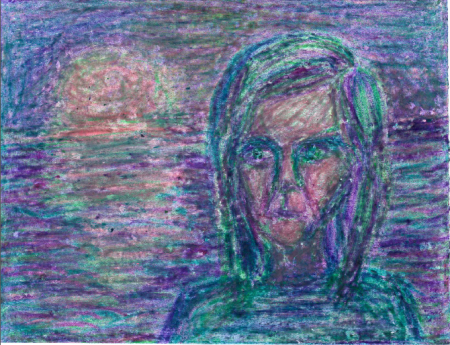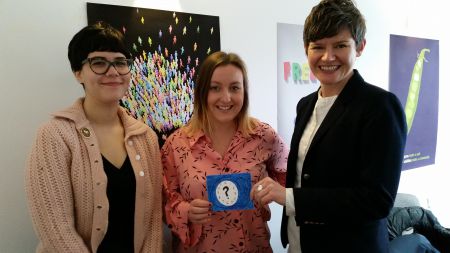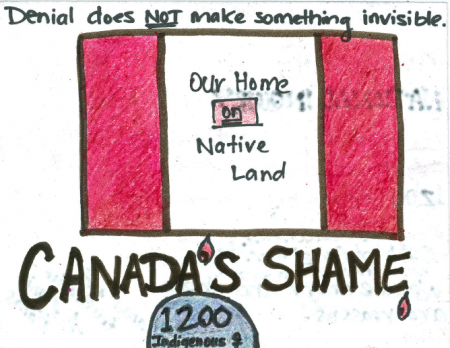Eliza Leitch and Katelyn Armstrong knew they wanted to take their school of social work project to the next level.
Studying social work, one learns a lot about oppression, says Armstrong. The question is “...what can we do and what will we do?”
When they were assigned a poster project, Leitch and Armstrong decided to do it on missing and murdered indigenous women and the call for a public inquiry.
The project “Calling Cards: Halifax for an Inquiry” was born.
At first, Armstrong and Leitch imagined postcards with stock photos that people would sign. But then realized they wanted the messages to come from people’s hearts.
“We made the decision at the beginning that we didn't want to have it be, 'Here is the message, sign your name,'” says Leitch. “We wanted it to be individualized and personal.”
Leitch and Armstrong created blank postcards addressed to MP Megan Leslie's office. From there, they provided crayons, markers, pens and pencils so people could draw pictures, write messages or simply sign their name if that was all they wanted to do.
“What should I write? What should I say?” asked participants.
“Whatever you want,” was the response.
People were almost paralyzed by the creative freedom, laughs Leitch.
“Our campaign was incredibly personal so it forced people to stop and think, ‘What is my message?’ It was challenging,” says Leitch.
But Leitch and Armstrong welcomed the challenge as they wanted to make people think about the problem, instead of just taking five seconds to contribute their name to a list.
“A lot of people at school were like, 'I don't have time but I'd like to sign something,'” says Armstrong.
This reaction says a lot about the problem of violence against aboriginal women, says Leitch. When people don’t know what to say, they also don’t know where to begin when it comes to action.
“[For] people like me - I am a white woman living in Canada - this problem is really far removed from my day to day existence...[For] the majority of people on campus and in Halifax, there's this idea that 'It's an aboriginal problem [and] I don't know what to say about it.'”
This distancing from the problem tends to cause people to lose their voice on the issue, Leitch continues, which is part of the reason why there is so little action to stop violence against missing and murdered aboriginal women.
Leitch and Armstrong launched their card making project at the Violence against Women rally in Halifax on December 6th, leaving cards and drawing tools on every table.
Through the positive support of activists at the rally, Leitch and Armstrong were able to take their calling cards to other Halifax events, such as a Dal Art Event with the queer community and a high school in Dartmouth for their December 6th themed assembly.
The Calling Card project created 215 postcards that were given to Megan Leslie on March 5th.
For Leitch and Armstrong, it wasn't just about the number of cards but also the thought provoking words and art Haligonians contributed to the project.
“Justice for all missing and murdered indigenous women. Am I next?” reads one postcard. “Why does this highway have to be paved with tears,” reads another.
Megan Leslie welcomed Leitch and Armstrong’s contributions to getting a national inquiry. She will be tweeting pictures of the cards throughout the next couple of weeks as she prepares to give them to Prime Minister Harper.
The murder of Loretta Saunders last year in Halifax brought the issue of missing and murdered indigenous women closer to home for Leslie and many others in Halifax. “Loretta Saunders, by being an Inuk women, was four times more likely to go missing or be murdered than someone like me.” Says Leslie, “That is why we need an inquiry.”
Prime Minister Harper has stated that over 1000 missing and murdered indigenous women is not a sociological phenomenon but simply a string of crimes. Armstrong knows that the cards might be a futile gesture given Harper’s ideological bent.
So what have Leitch and Armstrong gotten from taking on such a huge issue? If anything, it has driven them to do more.
“For me [the cards] instigated a lot,” says Armstrong. “It caused that spark.”
“Average, everyday citizens need to get involved.” Says Leitch.





